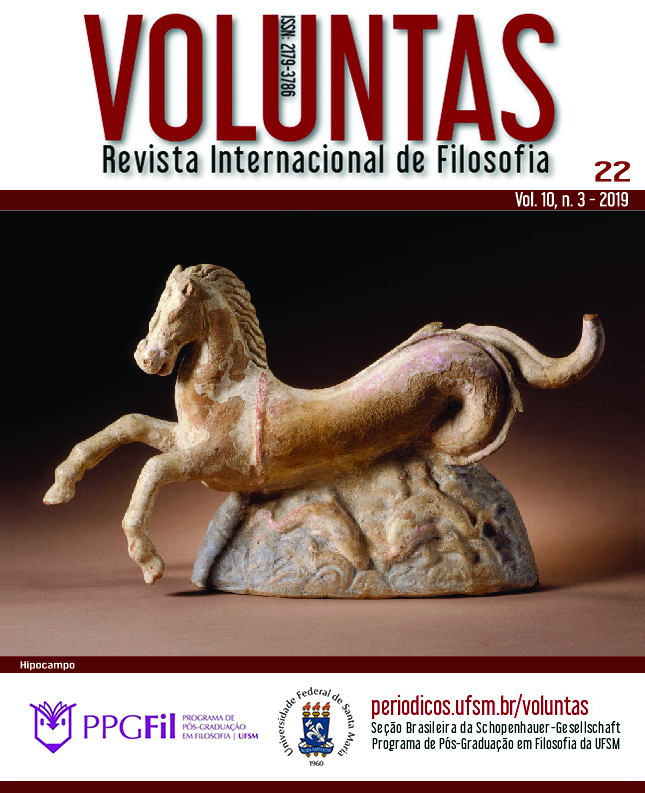Quackery as an aesthetic-philosophical problem in Schopenhauer
DOI:
https://doi.org/10.5902/2179378639684Schlagworte:
Style, Communication, Pedantry, ObscurityAbstract
The purpose of this paper is to present the philosophical questions that revolve around the ordinary Schopenhauerian accusation of quackery against his opponents. The study of these satellite-questions shows that quackery can be understood as a philosophical problem and not merely an offense empty of theoretical relevance, as commonly understood. They can be summarized as aesthetic or rhetorical questions, because they problematize the style of the philosophical text, its use and its communicative function. Close to the pedant and the sophist, the charlatan is one who abuses obscurity because of his distancing from concreteness by an option for abstract writing.Downloads
Literaturhinweise
DIDEROT, Denis. Charlatannerie. In: DIDEROT, Denis & D’ALEMBERT, Jean le Rond. Encyclopédie ou dictionnaire raisonné des sciences, des arts et des métiers. Vol. 3. Paris: Briasson, David, Le Breton & Durand, 1751-1772.
GOETHE, Johann Wolfgang von. Faust. Trad. G. Nerval. Paris: Librio, 1995.
GRACIÁN, Baltasar. El Criticón. Tomo Tercero. Philadelphia: University of Pennsylvania Press, 1940.
HEIDEGGER, Martin. Nietzsche I. Trad. Marco Antonio Casanova. Rio de Janeiro: Forense universitária, 2010.
KIVISTÖ, Sari. The vices of learning: morality and knowledge at early modern universities, Leiden / Boston, Brill, 2014.
PHILONENKO, Alexis. Schopenhauer, une philosophie de la tragédie. Paris: Vrin, 1999.
RAMOS, Flamarion Caldeira. A “miragem” do absoluto: sobre a contraposição de Schopenhauer a Hegel. Crítica, especulação e filosofia da religião. Tese de doutorado. São Paulo: USP, 2008, 252 p.
ROOS, Richard. Introduction. In: SCHOPENHAUER, A. Le monde comme volonté et représentation. Paris: P.U.F., 2009, pp. xi-xxii.
ROSSET, Clément. Schopenhauer, philosophie de l’absurde. Paris: PUF, 1994.
SCHOPENHAUER, Arthur. O mundo como vontade e como representação. Trad. Jair Barboza. São Paulo: UNESP, 2005.
SCHOPENHAUER, Arthur. Crítica da filosofia kantiana. In: O mundo como Vontade e como representação. Trad. Jair Barboza. São Paulo: UNESP, 2005.
SCHOPENHAUER, Arthur. Suppléments. In: Le monde comme volonté et représentation. Trad. A. Burdeau. Paris: P.U.F., 2009.
SCHOPENHAUER, Arthur. Parerga et Paralipomena. Trad. J-P. Jackson. Paris: CODA, 2010.
SCHOPENHAUER, Arthur. Die Beiden Grundprobleme der Ethik. In: Sämtliche Werke, Mannheim: F. A. Brockhaus, 1988, t. 4.
UCCIANI, Louis. Comment Heidegger évince Schopenhauer. In: Philosophique, 9, 2006, pp. 89-102.
Veröffentlicht
Zitationsvorschlag
Ausgabe
Rubrik
Lizenz
Die Einreichung von Originalen an diese Zeitschrift impliziert seitens der Autoren die Übertragung der Rechte zur gedruckten und digitalen Veröffentlichung. Die Urheberrechte für die publizierten Artikel liegen beim Autor, wobei der Zeitschrift das Recht zur Erstveröffentlicheng zukommt. Die Autoren dürfen dieselben Resultate in anderen Publikationen verwenden, wenn sie deutlich auf unsere Zeitschrift als ursprüngliches Publikationsmedium hinweisen.
Lizenz
Creative Commons Namensnennung - Nicht-kommerziell - Weitergabe unter gleichen Bedingungen 4.0 International (CC BY-NC-SA 4.0).






